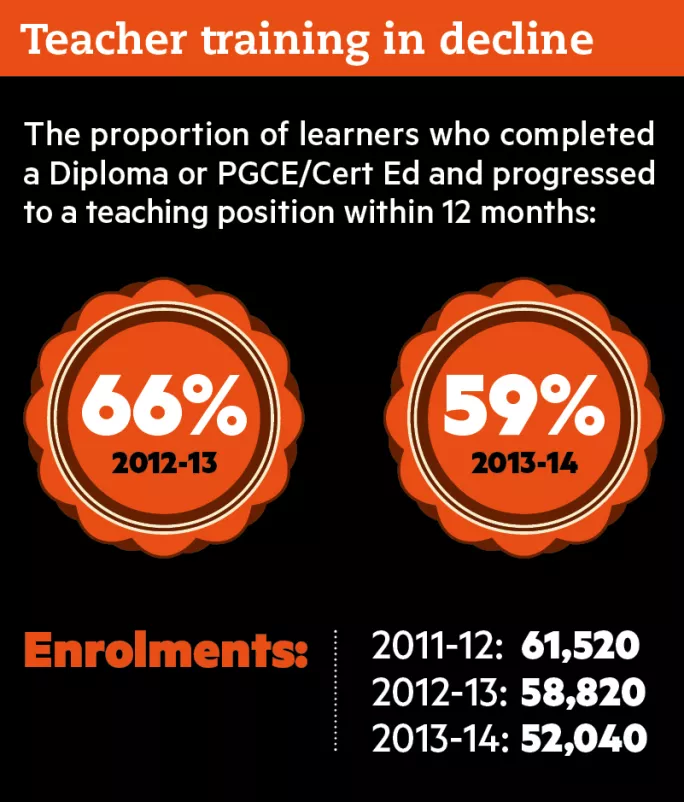- Home
- Nearly half of new FE teachers can’t find a job
Nearly half of new FE teachers can’t find a job

More than four in 10 newly trained FE teachers are failing to secure a job in the sector within a year of completing their training, TES can reveal.
According to new research from the Education and Training Foundation (ETF), just 59 per cent of learners who completed a Diploma, PGCE or Cert Ed qualification in 2013-14 went on to find a teaching job in FE within 12 months - a 7 percentage point drop from the previous year.
The ETF’s second annual report on initial teacher education (ITE) provision in FE also reveals that there has been a significant drop in the number of prospective FE teachers enrolled on training courses.
There were just over 52,000 learners signed up in 2013-14 - a decline of 15 per cent from the 61,520 enrolments in 2011-12. The figures cover a variety of courses, including Diplomas, Awards, PGCEs and Cert Eds.

The requirement for FE teachers to be qualified was dropped in 2013, as recommended in the Lingfield report a year earlier. This argued that the move would help to “free the FE sector from unnecessary regulation and bureaucracy and enable it to take responsibility for its own professionalism”.
The ETF’s report also shows that the rate of learners successfully finishing their courses has dropped. “The number of learners completing Awards has remained fairly constant over the last three years, but the number of learners achieving Certificates, Diplomas or PGCEs/Cert Eds have all declined,” the report says. Among the 2013-14 cohort of learners who went on to get a teaching job within 12 months, 63 per cent found a full-time role - down from 70 per cent the previous year.
However, salaries for those who did find work rose slightly, with more than two-thirds of the 2013-14 intake who managed to secure a role earning between £20,000 and £30,000.
Specialisms buck the trend
The number of providers delivering specialist Diplomas has also increased in the past year, with 34 providers currently delivering the numeracy subject specialism, compared with 26 in 2014-15.
The number of providers delivering literacy and/or English for speakers of other languages (Esol) increased from 31 to 36, and the number of providers delivering the SEND subject specialism went up from 13 to 18.
James Noble-Rogers, executive director of the Universities’ Council for the Education of Teachers, said falling college budgets were the main factor behind the negative trends.
“That is why there are going to be fewer people training, and the temptation of training people on the cheap is going to get greater,” he added. “Deregulation has gone too far. Until we get regulations back, it is about encouraging colleges to make sure their staff are properly qualified. We have to promote professionalism.”
David Powell is the director of the Education and Training Consortium of higher education and FE teacher training providers, led by the University of Huddersfield, the largest accreditor of FE teacher training programmes in the country.
“[The] Lingfield [report] is really starting to bed in, in terms of organisations being, in some instances, more relaxed about teaching qualifications,” he said. “Colleges normally expect a level 5 qualification, but other providers are not always so demanding. There is obviously a link between the number of people completing qualifications and the availability of jobs. What we are also finding is that quite a lot of people are seeking jobs in schools.”
Colleges must make sure that their staff are properly qualified
Last month, TES revealed that overall staff numbers in colleges dropped by 9 per cent in the three years up to 2014-15. Mr Powell welcomed the increase in prospective FE teachers enrolling in specialist courses. “The Diploma makes them better teachers of maths and, if you are talking about people doing [GCSE] resits and so on, that is important,” he said. “The challenge is making the courses viable.”
Catherine Sezen, policy manager for 14-19 and curriculum at the Association of Colleges, said that all teacher-training courses should include more information about job opportunities in the FE sector.
She added that salaries played a role in decisions about which sector to work in. “It’s encouraging to see the increase in people taking specialist Diplomas,” she said. “And the increase in the uptake of English and maths qualifications is not surprising given the increase in students taking those subjects. We would anticipate the figure to rise further in the coming years.”
Helen Pettifor, director for professional standards and workforce development at the ETF, said: “We’re pleased to provide a solid evidence base on ITE in further education and training. In this deregulated space, the quality of ITE [and] the clarity of progression routes…are crucial.”
Keep reading for just £1 per month
You've reached your limit of free articles this month. Subscribe for £1 per month for three months and get:
- Unlimited access to all Tes magazine content
- Exclusive subscriber-only stories
- Award-winning email newsletters



